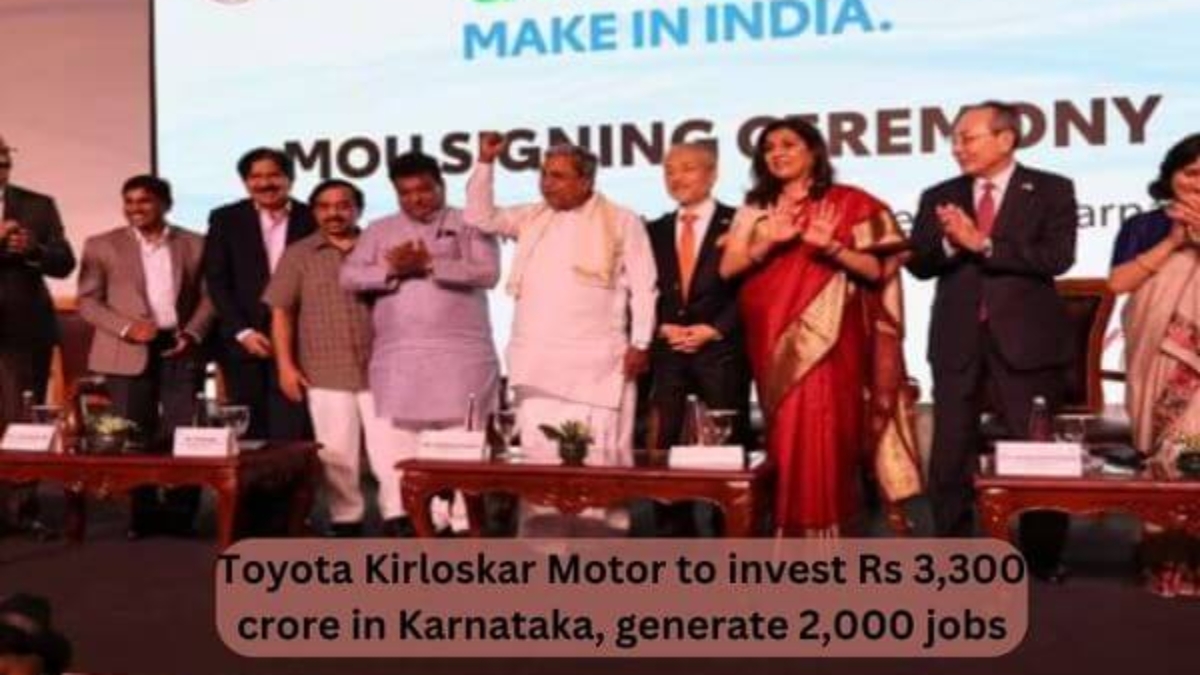Production of the new unit, which is expected to start in 2026, will be able to produce one lakh units annually in two shifts. The company’s current Bidadi facility, where it operates two units with a combined installed manufacturing capacity of up to 3.42 lakh units yearly, would host the setup.
In order to enable the company’s further expansion of its vehicle manufacturing facility at Bidadi, Karnataka, the Karnataka government and the major automaker Toyota Kirloskar Motor (TKM), an Indian subsidiary of Japan’s Toyota Motor Corporation, signed a Memorandum of Understanding (MoU) on November 21.
The Memorandum of Understanding states that TKM will invest an extra Rs 3,300 crore to build a third manufacturing plant in Bidadi, some 35 km from Bengaluru, with a capacity of one lakh units. This plant will employ up to 2,000 people.
Production of the new unit, which is expected to start in 2026, will be able to produce one lakh units annually in two shifts. The company’s current Bidadi facility, where it operates two units with a combined installed manufacturing capacity of up to 3.42 lakh units yearly, would host the setup.
Chief Minister of Karnataka Siddaramaiah remarked, “Toyota’s plans for further investments in the state, evident since 1997, are an example of the state consistently remaining an attractive destination.”
According to TKM executive vice president & country head Vikram Gulati, the new facility will not only produce the multi-utility vehicle Innova HyCross, but it will also be “future-ready” to roll out models spanning diverse fuel technologies.
“Karnataka, as the pioneer in releasing a dedicated EV policy in 2017 updated in 2021, stands as the leader in attracting investments of Rs 25,000 crore, spanning the entire EV value chain,” stated MB Patil, the Minister for Large and Medium Industries in Karnataka. With around 2 lakh electric vehicles registered in the state, Karnataka is committed to changing the face of transportation.”
According to him, the government is launching a new clean mobility policy that will establish Karnataka as the leading location for the production of electric vehicles (EVs), covering the whole value chain from the production of batteries and cells to the manufacture of components, OEMs, infrastructure for charging and testing, and research and development.
Yoshimura went on to say that TKM will keep working with the government to create a state-of-the-art domestic system that offers India’s best interests by enhancing energy security, fostering economic expansion, and reaching carbon neutrality.
Masahiko Maeda, CEO of Toyota’s Asia Region, stated in a statement: “We have always placed a high value on the Indian market. We are optimistic that TKM’s role in our global vision for a bright future will be further elevated by the new investments in India, as we continue to create sustainable mobility solutions that improve people’s lives all around the world.”
An agreement to spend Rs 4,100 crore was inked by Toyota group companies, including TKM and Toyota Kirloskar Auto Parts, with the Karnataka government last year. The purpose of the investment was to accelerate the transition to greener technologies, improve electrification, and reduce CO2 emissions more deeply. Toyota has made a total of 16,000 crore rupees in various investments in India thus far.
“With this, the government aims to attract investments of Rs 50,000 crore across the entire EV value chain, generating approximately 100,000 new jobs and establishing a comprehensive and supportive EV ecosystem in the state,” Patil stated.
Masakazu Yoshimura, the CEO and managing director of TKM, stated at the event, “As a future-ready mobility company, we are confident that today’s significant MoU with the Karnataka government for the new plant will positively contribute through consequent employment generation and expand the adoption of advanced clean technologies.”

